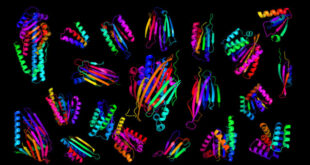According to new research from the Fred Hutchinson Cancer Research Center, night shifts may hinder the body’s ability to repair DNA damage caused by normal cellular processes.
The study suggests that night work is associated with reduced repair of 8-OH-dG lesions in DNA and that the effect is likely driven by melatonin suppression occurring during night work relative to night sleep. Image credit: Skeeze.
Previous research by the same team of 223 night shift workers showed that day sleep was associated with lower levels in their urine of a chemical by-product of active DNA tissue repair called 8-hydroxydeoxyguanosine (8-OH-dG) than night sleep — potentially indicating reduced capacity to repair cellular damage.
The findings led them to conclude that the key factor behind this observed difference was likely to be suppressed production of the ‘sleep hormone’ melatonin during day sleep relative to night sleep.
In a bid to explore whether lower levels of 8-OH-dG might also be found in those working night shifts compared with those getting a normal night’s sleep, Fred Hutch epidemiologist Dr. Parveen Bhatti and co-authors measured 8-OH-dG levels in the stored urine samples of 50 night shift workers from the previous study.
These 50 people had exhibited the widest discrepancies in levels of circulating melatonin between night work and night sleep.
Analysis of the urine samples showed that melatonin levels were much lower when taken during a night shift than when taken during a normal night’s sleep.
After taking account of potentially influential factors, such as alcohol consumption and shorter sleep duration (average 5.5 hours) during the day preceding a night shift, 8-OH-dG levels were only 20% of those observed during a normal night’s sleep (average 7.5 hours).
“A particular pathway called nucleotide excision repair (NER) is thought to be involved in the repair of DNA damage caused by oxygen free radicals, which are produced during normal cellular activity,” Dr. Bhatti and colleagues said.
And research has shown that melatonin production boosts the activity of the genes involved in the NER pathway.
“This is an observational study so no firm conclusions can be drawn about cause and effect, added to which the study participants were mostly white, working in healthcare, and of similar age, so making it difficult to apply the findings more generally,” the authors said.
“We were also unable to collect data on the participants’ dietary patterns and circulating antioxidant levels, both of which could have been influential.”
“Our results indicate that, relative to night sleep, reduced melatonin production among shift workers during night work is associated with significantly reduced urinary excretion of 8-OH-dG,” they said.
“This likely reflects a reduced capacity to repair oxidative DNA damage due to insufficient levels of melatonin and may result in cells harboring higher levels of DNA damage.”
“If such effects are confirmed, melatonin supplementation should be explored as an intervention to reduce the occurrence of potentially carcinogenic DNA damage among shift workers.”
The findings are published in the journal Occupational Environmental Medicine.
_____
Parveen Bhatti et al. Oxidative DNA damage during night shift work. Occupational Environmental Medicine, published online June 26, 2017; doi: 10.1136/oemed-2017-104414
 #Bizwhiznetwork.com Innovation ΛI |Technology News
#Bizwhiznetwork.com Innovation ΛI |Technology News




